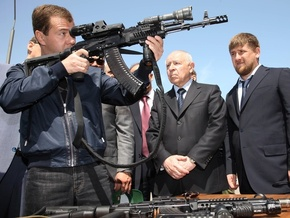Revising the victory (weekly review) By Vadim Borshchev, special to Prague Watchdog
Medvedev's penchant for brutal gestures and statements has long been the object of good-natured teasing and even some sympathy in Russia's mass media. Indeed, being nominally the highest official in the land, yet forced to make do with the role of junior partner while conscious of his subordinate position, he is at least entitled to compensate for his lack of authority and power with strong language. But Dmitry Alexandrovich’s habit of knitting his brows in a look of threatening inquiry often leads him into areas that are traditionally considered the exclusive jurisdiction of his senior companion. It is not that Medvedev is demonstratively kept at a distance from any problems of state (though it would appear that this does sometimes happen), simply that the groundwork for the assessment of the situation in the North Caucasus is normally done by Mr Putin. For many years the Russian government attempted to convince public opinion that the strategy of force employed in Chechnya was successful, that by and large the issue of the armed underground was resolved, and that a few individuals who continued to spoil the overall picture were unable to prevent the establishment of peace and stability in the region.
Public opinion trusted the authorities and tried to ignore the obvious inconsistencies in the official version. There is also the fact that, the myth of the pacification of the Caucasus still remains the basis of Vladimir Putin’s popularity. However, the need for a revision of the traditional approaches is becoming increasingly more apparent, and Dmitry Medvedev’s statements in Stavropol last week can obviously be seen as an attempt to give a more realistic and rational picture of what is happening. At a meeting with law enforcement agents on August 19, the President of the Russian Federation, very probably without the slightest intention of doing so, successfully managed to consign to the scrapheap the whole of Putin's concept of Russian military and political victory in the Caucasus. This is how Medvedev summed up the results of ten years of war: : "Some time ago the impression began to be formed that the situation in the Caucasus with regard to terrorist acts had considerably improved. Unfortunately, recent events show that this is not so ..."
Of course, the significance of Medvedev’s oratorical experiments should not be exaggerated, and he should not be presented as a maverick and a realist undermining his boss. More than a year's experience has shown that the new Russian president is quite free of any intent to rebel or get out of control. The harshness of his statements is really an expressive device whose objective is to show those around him that he at least capable of independent thought. At the Stavropol meeting the president took a sceptical view of the standard theory concerning the key role played by certain foreign centres in stirring up internal conflict in the Caucasus. This simple ditty is also a favourite of Ramzan Kadyrov, who likes to recite it: "You spoke... of the influence of international factors, such as the financing of the bandit underground, the export of religious extremism - these external factors exist ... But sadly, the main reason has its roots within Russia," – the president explained to those present, in a serious, grown-up manner. Quite recently, however, in Dagestan, he also spoke with conviction about "monsters from abroad". Medvedev is no more of a realist than Putin – it is simply that this is what the times demand. One cannot go on saying for years on end that the fire in the house has been extinguished while ignoring the fact that the fire has already engulfed the entire city.
In itself, the thought that the North Caucasus is far from being at peace can hardly be transformed into a clear understanding of what is to be done. Medvedev can frown and entertain everyone with his grimaces all he likes, he can make all sorts of sweeping statements, but no one except analysts interested in the inner workings of the tandem of power will pay any attention to what he says. Public opinion understands that for as long as the real owner of the cannons, planes, various death squads and the "peacemaker", Ramzan Kadyrov, does not change his attitude towards the North Caucasus, everything will remain the same.
But if Medvedev really feels that he is entitled to engage in freethinking at no risk to his career, the times really are changing. And this is above all a bad sign for Ramzan Kadyrov. The Putin-era reality in the North Caucasus is now beginning to crumble fast, despite the enormous infusions of cash and the reliance on the local tonton macoute. The current Russian prime minister, who seems to have plans to return to power in a few years, cannot afford to stand idly by as the foundations of his charisma and legitimacy come tumbling down. Alas, it is time for an urgent quest for new approaches. And if that is so, then the old tools, which only seemed to be effective, need to be replaced. And that is above all true of Putin’s personal “guardsman”, who has shown himself to be quite good at building houses, killing and taking care of his own well-being, but is completely devoid of any talent for creating even the semblance of a reality that is comfortable or at least acceptable for others to live in. Is not he one of the fundamental causes of the approaching disaster? That is a question from which the federal centre cannot turn away.
Photo: razvlekalo.ru. (Translation by DM) (P, DM)
DISCUSSION FORUM
|

